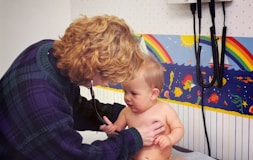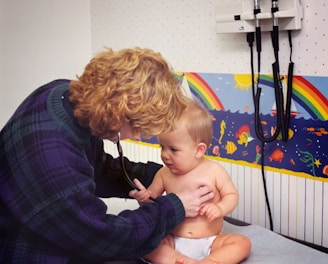
Essential New Born Tests: Ensuring a Healthy Start
The birth of a baby is undoubtedly one of the most joyous occasions for parents and their loved ones. It is a time filled with immense happiness and anticipation for the future. Naturally, as parents, we always want our precious little ones to be safe and healthy. It is only natural for us to have a certain level of anxiety and concern, constantly wondering if everything is going well with the baby. Ensuring the well-being of our babies is of utmost importance to us. We strive to provide them with the best possible care and attention, and we eagerly await each milestone and development in their lives. Health Check up is the often used term. Question is do all the babies need Health Check up? The answer is Yes.


NEWBORN EXAMINATION-
New born baby check- is a crucial clinical examination performed on every baby shortly after birth. Typically conducted within the first 24 to 48 hours, this examination aims to detect any immediate common or rare issues that may require urgent medical attention. It is highly recommended that this assessment is carried out by a well-trained medical professional, not necessarily a doctor. This could be a midwife or nurse who has received adequate training to perform the examination accurately. The comprehensive nature of this check ensures that any potential problems are identified early on, allowing for timely intervention and treatment if necessary.
There are certain important medical conditions that cannot be diagnosed through a simple examination and require specific screening tests. Developed nations, in particular, have facilities for routine screening tests such as Guthrie's Spot Test, Newborn Hearing Test, and Ultrasound Examination of Hips for high-risk babies. Guthrie's test alone screens for around 10 to 11 different diseases. However, the cost of conducting all these screening tests is likely to be expensive for the majority of the global population. Nevertheless, it is possible for most countries (or even individual parents/families) to carry out at least some of these tests, and the expenses incurred would be justified considering the potential benefits they provide.


TSH test: The thyroid gland, located in our neck, is responsible for producing a hormone called Thyroxin. When this gland fails to function properly, it results in a condition known as Hypothyroidism or Underactive Thyroid. In cases where this condition is present from birth, it is referred to as Congenital Hypothyroidism. Although not uncommon, Congenital Hypothyroidism is estimated to affect 1 in 2000 to 1 in 4000 births. If left untreated, it can lead to permanent mental disabilities and growth failure. However, early treatment has shown to enable a normal life. To diagnose this condition, a Simple Blood Test called TSH is usually conducted between day 7 to day 10 of life. If the results are abnormal, the baby's Medical Professional will guide the parents on the next steps, which may involve repeating the test for confirmation.
Hearing Screen: Hearing loss from birth is not uncommon, occurring in approximately 1 to 2 out of every 1000 births. The risk of deafness is higher if the baby has received intensive care or if there is a family history of deafness. If left undetected, it can lead to lifelong mutism, or the inability to speak. It is our belief that the right to early detection and prevention of deafness and mutism should be granted to all newborn babies. Some countries have implemented a Newborn Hearing Screening program, which can be conducted before the baby is discharged from the hospital or within the first few weeks to three months of life. The test used for screening is called Automated Otoacoustic Emission. We propose that hospitals, paediatricians, neonatologists, audiologists, and ear nose and throat surgeons work together to establish and implement such a program.
Hip Joint Screening Test: Hip Joint Examination and Ultrasound for Hips are crucial in detecting and preventing developmental dysplasia or congenital dislocation of hips, which can result in long-term disabilities if left untreated. As part of the routine newborn examination, all babies should undergo a thorough assessment of their hip joints. If any issues are identified, further evaluation through an ultrasound test for hips becomes necessary. Additionally, ultrasound hip screening may be required for babies with other risk factors. It is essential to consult with an obstetrician, neonatologist, or a trained medical professional with expertise in this area to ensure accurate diagnosis and appropriate management. Taking proactive measures to assess and address hip joint health in infants is vital for their overall well-being and long-term mobility.
Other blood tests- these depend on various Genetic diseases common in your geographic areas, communities or families. Some examples are- Sickle Cell Disease, Thalasemia, Cystic Fibrosis. Your hospital or Medical professional should be able to help if these screening tests are needed for your baby.
Test for Thyroid: TSH
Newborn Hearing Screen
Hip Joint Screen
Other Tests.
“Knowledge grows by sharing.
You can only have more for yourself by giving it away to others.”
― Brian Tracy
Pramod SS Limited
